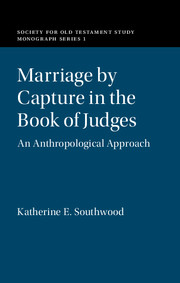Book contents
- Frontmatter
- Contents
- Preface
- 1 Methods, Considerations and Recent Approaches to Judges 21
- 2 Contextualised Outline of the Causes for and Consequences of Marriage by Capture
- 3 Virginity, Marriage and Rape in the Hebrew Bible
- 4 Judges 21 as an Example of Marriage by Capture in the Hebrew Bible
- 5 Marriage by Capture within an Ethnic Narrative: Judges 21 as a Social Critique of Superficial Unity in the Persian Period
- Conclusion
- Bibliography
- Author Index
- Thematic Index
3 - Virginity, Marriage and Rape in the Hebrew Bible
Published online by Cambridge University Press: 30 March 2017
- Frontmatter
- Contents
- Preface
- 1 Methods, Considerations and Recent Approaches to Judges 21
- 2 Contextualised Outline of the Causes for and Consequences of Marriage by Capture
- 3 Virginity, Marriage and Rape in the Hebrew Bible
- 4 Judges 21 as an Example of Marriage by Capture in the Hebrew Bible
- 5 Marriage by Capture within an Ethnic Narrative: Judges 21 as a Social Critique of Superficial Unity in the Persian Period
- Conclusion
- Bibliography
- Author Index
- Thematic Index
Summary
As noted in Chapter 2, the high valuation of virginity and the proscription of sexual activity outside of, or prior to, marriage is one of the dominant features of societies wherein marriage by capture occurs. Furthermore, virginity is often contextualised, at an emic level, within a complex ideological framework which links it to ideas such as purity, spirituality and the assurance of unambiguous fatherhood. However, from an etic perspective, virginity may be located within the honour/shame system through being linked to ideas such as male honour and female sexual modesty. As a consequence, the loss of virginity outside of marriage leads to social stigmatisation and shame not only for the woman in question but also for her entire family, as well as a loss of marriageable status or heavily reduced bride-wealth. Ironically, marriage systems wherein virginity is expected prior to marriage and where a bride-price is expected for virgin wives, enable marriage by capture to occur since once virginity is taken (or even implied to have been taken) marriageable status and bride-price are also lost. These features of such marriage systems are also given an extra layer of complexity through the prevalence of the expectations for marriages to be endogamous. This chapter explores various texts where such issues occur to establish some of the expectations which may have existed for readers of Judges 21.
Marriage Laws and the Importance of Virginity
Many of the characteristics of the marriage systems examined formally can be found through the various representations of virginity and marriage within the Hebrew Bible. While acknowledging inevitable differences between what is described within Judges 21 and what occurs within the Hebrew Bible more generally, it is, nevertheless, helpful to gain some approximation of the cultural and social expectations surrounding marriage which may have informed how the writers, editors and early receivers of Judges 21 interpreted the text. An excellent place to begin analysing virginity and marriage within the Hebrew Bible is by looking at the laws surrounding sexual behaviours. We should initially recognise here that there is a lack of transparency regarding the extent to which texts such as these established or reflected societal sexual mores, norms and folkways.
- Type
- Chapter
- Information
- Marriage by Capture in the Book of JudgesAn Anthropological Approach, pp. 104 - 145Publisher: Cambridge University PressPrint publication year: 2017

